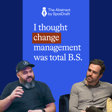
Ep 44: How an Opera Singer Became a Legal Ops Pro: Cory Clines, Legal Operations Consultant
How can training to be a professional opera singer translate into the legal operations profession? How do you build a career in legal ops without any formal training? And what role should technology play–if any–in a strong legal ops program?
Cory Clines, Legal Operations Manager at Campari Group, was able to transfer valuable lessons from his life as a conservatory-trained opera singer into his fifteen-year-long career in legal ops, like the importance of collaboration and the need for a shared vision among teams. In his current role and at former companies like Advance Publications and Lloyd’s, Cory was able to leverage his love of technology into managerial roles that revolutionized legal processes with efficiency-maximizing software.
Listen as Cory discusses how to develop strong relationships with tech vendors, building legal ops teams from scratch, earning the trust of your GC, the best ways to run an RFP, and more.
Read detailed summary: https://www.spotdraft.com/podcast/episode-44
Topics:
Introduction: 0:00
Training as an opera singer: 4:01
Considering skill transfer from opera to legal operations: 12:12
Moving forward by earning the trust of your GC: 14:46
Deciding to leverage technology in legal ops: 16:34
Running RFPs from an in-house perspective: 18:59
Identifying new opportunities to advance your legal ops career: 22:05
Advice to legal ops professionals who feel pigeonholed in one aspect of the role: 24:27
Considering how curiosity affects your work: 27:23
Questioning the need for tech expertise as a legal operations manager: 28:47
Looking back at tech implementations that went wrong: 31:20
Building a legal ops team from scratch at Campari: 38:14
Using tech to drive legal ops process: 41:15
Book recommendations: 46:01
What you wish you had known when you started in legal ops: 47:58
Connect with us:
Cory Clines - https://www.linkedin.com/in/corywilliamclines/
Tyler Finn - https://www.linkedin.com/in/tylerhfinn
SpotDraft - https://www.linkedin.com/company/spotdraft
SpotDraft is a leading CLM platform that solves your end-to-end contract management issues. Visit https://www.spotdraft.com to learn more.



















